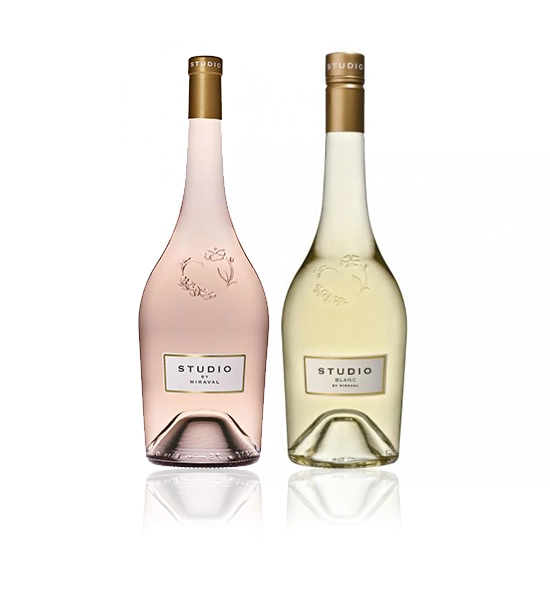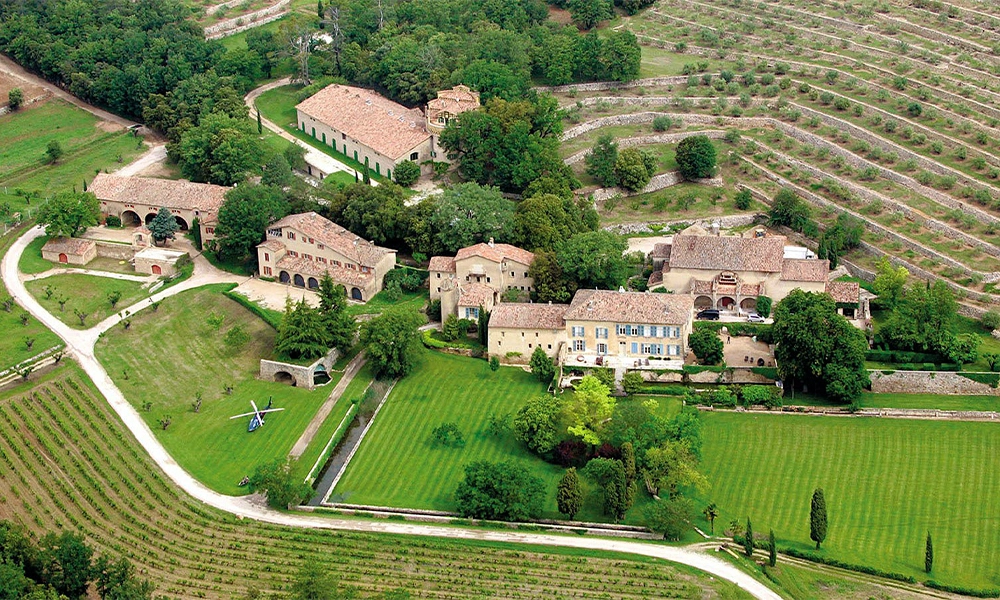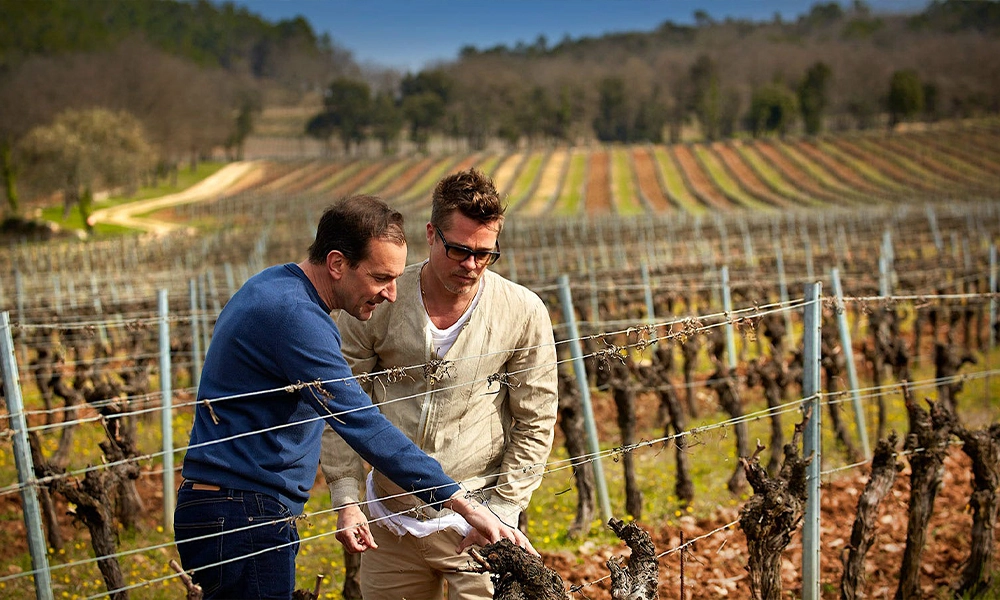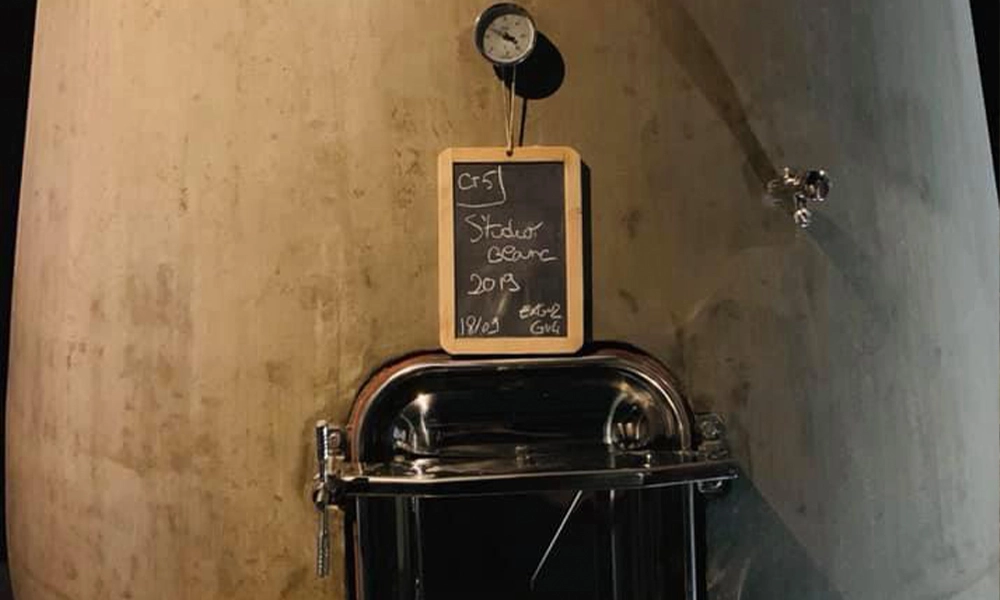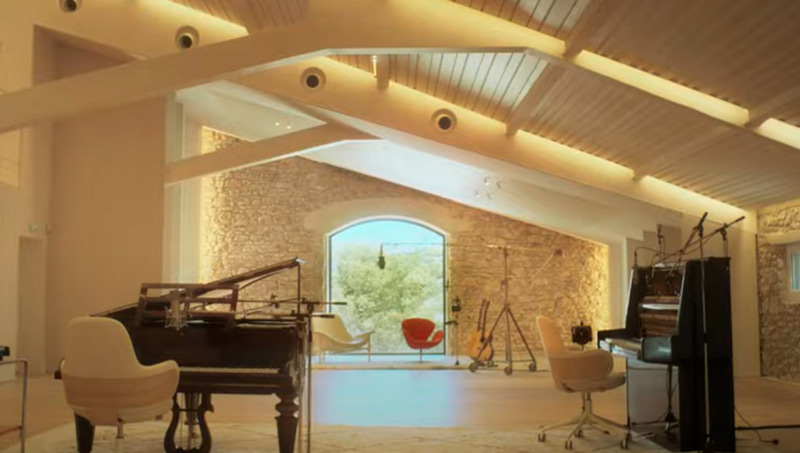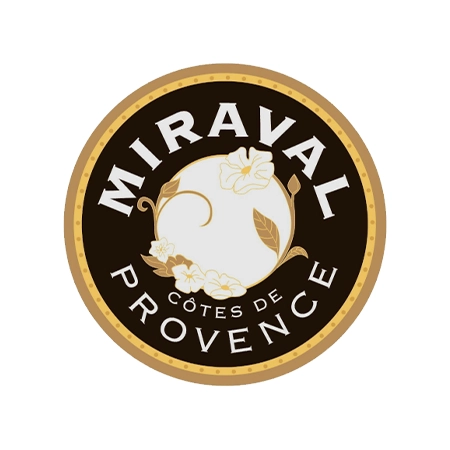
A land, a light, a soul, an inspiration and work of art.
Chateau Miraval is a wine estate bought by Brad Pitt and Angelina Jolie. An excellent property located in Correns in the Var, the first organic village in France. The vineyard covers 600 hectares in organic farming with two AOC appellations: Coasts of Provence and Coteaux Varois.
Coming from plots on the French Riviera, surrounded by olive trees and pine trees, Studio by Miraval is strongly influenced by the sea sprays and the proximity of the Mediterranean Sea. These salty soils give the wine a unique character and an almost iodized finish.
All the varieties are vinified by direct pressing. The Cinsault and Tibouren in Stainless steel vats. The Grenache & Rolle are partially vinified in tulip-shaped concrete vats with a rounded bottom. This ovoid shape gives rise to a natural convection movement that suspends the lees creating the same effect as a batonnage and gives the wine a lot of structure.
Rosé icon from the Perrin family and Brad Pitt
For everyone who wants to surround themselves with a touch of Hollywood, the Miraval rosé is just the right thing: The real star of the Jolie-Pitt house shines glamorously soft pink in the bottle, tastes fruity and elegant – and has all sorts of stories to tell . For example, that the Château Miraval is located in the middle of a romantic, private valley in Provence; that decades before Angelina Jolie and Brad Pitt fell in love with the property, stars were coming and going: bands like Sting, Pink Floyd, Sade, Rammstein and The Cranberries recorded their music in the recording studio set up by jazz pianist Jacques. Today the focus is again on wine. The Hollywood stars have brought special support on board: the legendary Perrin family of winegrowers cultivates the vines on the stone terraces at an altitude of 350 meters ecologically and with great expertise in terroir and quality.
The famous story of Chateau Miraval
In 2012, who could have guessed how the fairy tale of Angelina Jolie, Brad Pitt and their extended family would end? They actually did everything right with the setting for this romantic drama. The Château Miraval, which Brangelina bought in 2012 for around 40 million euros, is picturesquely situated in the middle of a private valley in Provence. The vast estate, which extends over 500 hectares, is surrounded by mature oaks, evergreen pines, pines, olive groves and vineyards.
The château also has a chapel where – watch out, Gossip – the two stars got married. But long before the Jolie-Pitts brought Hollywood glamor to Miraval, the castle was an illustrious „place of the arts“: The jazz pianist Jacques Loussier set up a recording studio here in 1977, which was used by bands such as Sting, Pink Floyd, Sade, Rammstein and The Cranberries was used. Wine was also produced back then – but more like Vin de Pays, simple, good country wine. In 1993 the American Tom Bove, an experienced winemaker, took over the estate. He renovated the wine cellar and thus laid the first foundation stone for the current success of „Hollywood wines“.
Above all, however, the Miraval wines today benefit from the know-how of the renowned French winegrowing family Perrin, which has held a 50 percent stake in Miraval since the beginning of Jolie-Pitt’s wine production and takes care of the winegrowing. The very first vintage of the flowery, fresh rosé hit like a bomb and has developed into a true cult wine.
La Rose de Chateau Miraval
With the 2012 rosé, Miraval sent a masterpiece out into the world – and also showed straight away that this cooperation between an experienced winemaking family and Hollywood glamour should definitely be taken seriously. The Miraval Côtes de Provence Rosé was celebrated as “Outstanding”: the first thousand cases of the “killer rosé” were quickly sold out.
And the enthusiasm continues, even if the first vintages are considered particularly fine. No wonder, because one rarely finds so much fruit and play in a rosé. The elegant, dense aroma of fresh strawberries, raspberries and herbs on the nose, lively freshness, a unique minerality and animating, lasting length on the palate. Marc Perrin wanted to produce a typical Provençal rosé that is juicy, fleshy and fresh at the same time. And by no means kitschy fruity as is the case with many other rosés.
Four grape varieties are used for the cult wine: the red varieties Cinsault, Syrah, Grenache and the white Rolle, also known as Vermentino. The grapes, which are harvested by hand in the cool morning hours and hand-picked twice, come from the château’s best plots and other best locations in Provence; while the Cinsault, Grenache and Rolle are pressed directly, the Syrah is vinified using the Saignée method. 95 percent of the wines are aged in stainless steel tanks, the rest in wood with battonage. The result is a Rosé Côtes de Provence that not only inspires in terms of content, but also simply because of its light, delicate pink shimmering colour.
The unique stone terraces of Miraval
The idyllic property of the Château Miraval is not only characterized by the romantic castle, the well-tended meadows and ponds – but also by the striking stone terraces that were built in the 19th century and which cascade up the slopes around the château – similar to man it is used to from the Wachau domain. In Miraval, the grapes for the white, red and rosé wines grow at an average altitude of 350 meters – the vines and the terroir are protected from the mistral winds thanks to the painstakingly restored, traditional stone walls.
In the exposed location, the grapes benefit from the warm, sunny days and cool nights. This gives them their special freshness and balance. A sophisticated irrigation system, which dates back to Roman times, supplies the vines with water in the southern French climate and allows healthy grapes to ripen.
The clay and limestone soil also plays an important role here: it stores the water required for dry periods and allows excess to drain away. In any case, the terroir around the château is unique: „In the Rhône, every plot that can be planted is planted,“ explains Marc Perrin. “But there is still a lot of untouched soil in Miraval – and the soil is incredible.” So not only the property is a place to fall in love with, but also the terroir!
Miraval’s closeness to nature
Although the Miraval wines are not certified organic, that in no way means that they are not organic. On the contrary. On the one hand, the château belongs to the community of the village of Correns, which can call itself the first „organic village“ in all of France. All year round, no artificial additives of any kind are used here – whether in agriculture or viticulture. And so the former Jolie-Pitt’schen vineyards are themselves certified organic.
On the other hand, the Perrin family has been a pioneer in the field of organic viticulture for decades and has remained true to its principles at Miraval. The stone terraces are cultivated 100% organically – neither herbicides, pesticides nor chemicals get into the vines or the terroir. The grapes are freshly picked by hand in the cool morning hours and then sorted by hand in two rounds.
Why do the wines still not have an organic seal? Because the winery has decided against labeling since 2012 for two reasons: The winegrowers want to retain the opportunity to use grapes from other, possibly also non-certified top locations for their cuvées and also continue to work with the method of tartaric stabilization, which is classified as organic in the USA but not yet in Europe.
Provence – Miraval’s recipe for success
When you think of Provence, you see lavender fields, poppies, rolling hills, gnarled olive trees, old mountain villages and the dazzling Côte d’Azur – but also wine! The history of Provençal viticulture began 2000 years ago when the Phoenicians first brought vines to the region. An infinite amount has happened since then: the wine region stretches over 200 kilometers from east to west.
Incidentally, the vineyards of Château Miraval extend over two appellations: Côteaux Varois en Provence and Côtes de Provence. The latter is the largest appellation in the region. Around 900,000 hectoliters of wine are produced in Provence – 80 percent of which are rosé wines. Based on Cinsault, Mourvèdre, Grenache, Syrah or Tibouren, all possible shades shimmer in the glasses and bottles: from salmon pink to tangerine. While in the rest of the world rosé was dismissed as an indefinable mixture of red and white, as a mostly too sweet drink for women, Provence has always been a true rosé Eldorado.
In the meantime, the others have also discovered the rosé for themselves: because it is associated with a light attitude to life and the quality has also increased significantly. Last but not least, the driving force behind this development was such high-quality products as the Miraval rosé – which is now world-famous and inspires with its fruity elegance.
Press and reviews
International reviews rave about the Miraval Rosé. The very first vintage of 2012 secured one of the coveted places on the Wine Spectator’s legendary „100 best list“ and awarded 90 out of 100 points: „Refined and elegant, offering pure and concentrated falvors of dried red berries, tangerine and melon. The focused finish features flint and spice notes, with a hint of cream. Drink now.“
But the newer vintages also get very good reviews. Falstaff awarded the 2016 92 points and wrote: “Bright salmon pink with a pink touch and silver reflections. Fresh apple fruit, delicate floral nuances, red berry appeal, mineral touch. Juicy, elegant texture, subtle fruit sweetness, pleasant acidity, sticky, subtle cherry fruit on the finish, can be used both as an aperitif and as an accompaniment to food.“ Decanter awarded the same number of points: „There’s no doubt about the quality of this fresh, elegant and wild strawberry -scented dry rose.“
All products offered can be ordered online (for registered customers), by e-mail or by phone. We will be happy to advise you on the selection. Contact us.
Customer registration
All products offered can be ordered online (for registered customers), by e-mail or by phone. We will be happy to advise you on the selection. Contact us.

